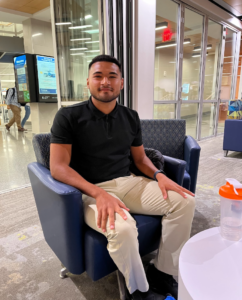By Brandon Fey, Staff Writer
On Tuesday, Nov. 7, the Office For Multicultural Engagement (OME) hosted Bullets Assistant Soccer Coach Marcos Garcia to speak about his experience as a first generation student-athlete. His talk was held in the Junction of the College Union Building at 6 pm.
Marcos Garcia is an experienced soccer player and coach, who, in addition to assistant coaching at Gettysburg College, is currently a member of the Harrisburg Heat (part of the Major Arena Soccer League). He played Division I collegiate soccer at Robert Morris University and also has playing experience with the D.C. United U23 club in Washington D.C. In addition, Garcia has trained with professional clubs in Honduras and Mexico, including the famous C.D. Guadalajara.

Marcos Garcia answers questions from the faculty and students in the CUB Junction following his talk.
(Photo Brandon Fey/The Gettysburgian)
As he began his talk, Garcia reflected on his journey to college by highlighting his background and formative experiences. He followed a strategic path to success with a focus on his education as a career safety net.
From a young age, sports taught Garcia the valuable leadership skills of teamwork, strategy and building relationships with team members. From his experience, he reflected on the value of recognizing one’s own struggles and seeking help, whether through talking to friends, coaches or therapy. Sports provided him with this kind of social outlet from which he learned leadership and teamwork skills, even in activities outside of academics, and how they can benefit personal and professional growth.
He emphasized the importance of constructive distraction and self-care he found in playing soccer, as well as the occasional video game to cope with his stress and anxiety. He encouraged students to prioritize self-care and take breaks when needed. He takes mental health very seriously, as he cited an instance when a player he had known lost his life in a battle with depression and anxiety. Garcia discussed the challenges of addressing mental health in men in particular, citing the stigma against male emotional transparency and the need for open communication.
“I think a lot of times we get in what school, and then you know, we often forget at times that we’re all human and need a break from it to disconnect a bit,” Garcia said.
The coach also advocated for versatility and adaptability in extracurricular activities, explaining the value for students in building a diverse resume and learning new skills.
Drawing from his experience with his coaches, Garcia discussed how he strives to personalize his coaching methods toward college athletes. This included a personalized approach and identifying individual strengths and weaknesses.
He also spoke on his understanding of the challenges faced by student-athletes, including balancing academics and athletics with a lack of resources and structure. Moving forward, he claimed there needs to be an emphasis on diversity, equity and inclusion to remove barriers for student-athletes and believed there should be implementation of study hours to help them better focus academically. He said university resources are also important in assisting student-athletes in their struggles with financial costs and mental health.
Garcia concluded his talk by expressing the fulfillment he feels in coaching soccer and working with college athletes.
